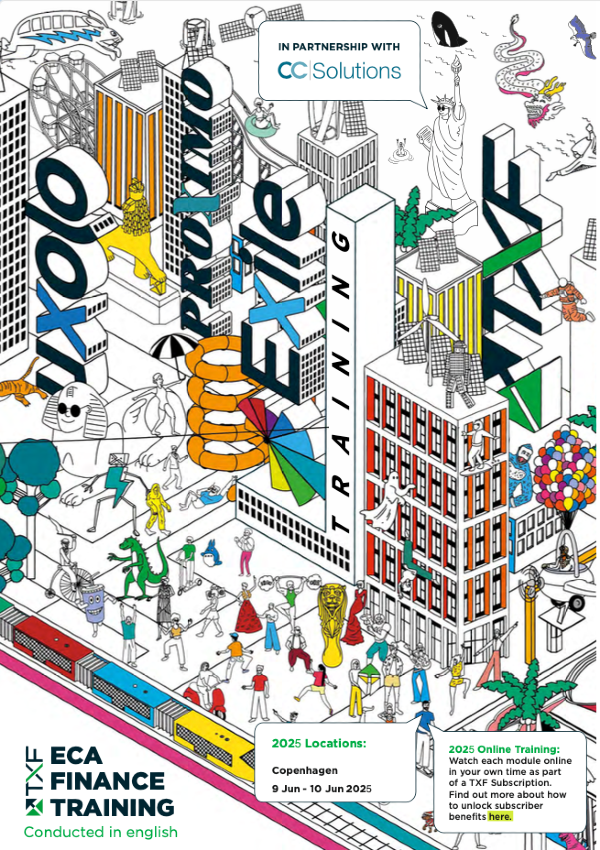Tapping fingers on the table for China trade at the ICC
TXF joined the ICC Banking Commission in Beijing as it celebrates a century of the institution whose founders were dubbed the ‘merchants of peace’. Katharine Morton contemplates the role of peace merchants amid the ‘warriors’ of trade and how China fits into the mix.

When somebody kindly poured me tea in Beijing, she told me it was polite in China to tap your fingers on the table. That’s not superstition, that’s gratitude, a form of covert bowing. She told me the origins of this practice are popularly held to come from a Qing Dynasty emperor going incognito among the locals and trying to prevent his courtier blowing his cover by bowing too effusively in public. This particular tradition of peaceful gratitude is one of the many things I learned in Beijing in the run up to the International Chamber of Commerce (ICC) Banking Commission annual meeting on 8-11 April which celebrated 100 years of the ICC itself. Will China’s multilateralism get lost in translation?
John Denton, secretary general of the ICC reminded the audience in his keynote that the ICC itself was founded to be ‘merchants of peace’ in response to the dislocations of the first world war. The thinking alongside the establishment General Agreement on Tariffs and Trade (GATT), which evolved into the World Trade Organisation (WTO), was that “you can’t have international trade without a functioning international dispute resolution,” Denton said. This ultimately led to the ICC International Court of Arbitration and a functioning system that has stepped in on many international disputes (from post-war Yugoslavia, post-apartheid South Africa and now Venezuela) and in environment treaties to “crowd in and engage private sector parties”. The ICC has a permanent observer seat at the UN, with a mandate to secure peace, prosperity and opportunity for all.
“It’s our duty to become engaged,” Denton said. “The multilateral trading system operation has helped liberate [millions] from abject poverty. It’s our duty to fight to maintain multilateral trade systems.” The idea of fighting to maintain peace may seem an oxymoron, but in the weaponised words of international trade nowadays, somehow it doesn’t jar. Denton added that it was the ICC’s role to preserve the system and ensure a spirit of modernity to ensure that the multilateral trading system becomes fit for purpose in the face of climate change, modern slavery and world trade reform, among others. “These are business issues, and we cannot afford to sit on the sidelines,” Denton said, asserting that the only institution gaining an increasing level of public trust is business itself.
In defence of multilateralism
Does multilateralism still have defenders outside the organs of global trade infrastructure like the ICC? China, for one, is holding itself up as one of its main supporters. I have been contemplating how China will manage international expansion amid a backdrop of slowing growth – both in China and globally – with the help of the experts: a roundtable assembled of multinational corporates, economists, Chinese banks, digitisation specialists, fintechs, China trade experts and export finance professionals in Beijing, and I’ll publish more on their findings at a later date. Crystal ball gazing in China, about China, is an opaque game, as one Beijing-based banker confessed, “we don’t have any more information than you do.” There are positives and negatives to take away.
For companies and trade professionals sitting in Europe and the US, or pretty much any place in the world, China’s growth rate forecast of more than 6% a year looks like a nice problem to have, almost double the rate of most western economies. In its Asian Development Outlook (ADO) 2019, ADB projects gross domestic product (GDP) growth for the world’s second largest economy to slow to 6.3% in 2019 and 6.1% in 2020. That is below the 6.6% growth rate recorded last year. A slowdown, but one that could still be envied. Other forecasters are even more optimistic, with Leland Miller in his China Beige book (which tracks 3,300 Chinese companies for its analysis) pointing to a recovery in the first quarter of this year. The tone is not relentlessly sanguine though, even as China’s proportion of world trade in volume terms is now the same as that of the US (10.2%). But nor is it pessimistic.
China is certainly being touched by trade wars in the short term. As one local banker said, trade tensions have certainly hit SMEs in places such as Guandong where exports to the US have collapsed and stockpiling has distorted imports. Distinctions must be made between domestic and international trade and the central bank continues to extend large amounts of credit to corporates adding to an opaque debt burden. Many MNCs in China see the country both as a market and a source – and so can find themselves hit both sides of the trade tensions. Nonetheless, some have been able to gain access to export finance through China’s insurer Sinosure, all part of the country’s overt defence of multilateralism. At the same time, one unintended consequence of regulation has been to shut down international insurers’ ability to provide trade credit insurance in China.
In short term trade, digitisation has had a huge impact on cross border commerce. In a keynote session Liu Yunfei, deputy general manager in Bank of China’s Global Trade Service Department quoted from a report from 2017 which saw total transaction volumes in e commerce across borders rising by 20% from the previous year to CNY8 trillion [US$1.2 trillion]. “If we extrapolate that to 2018, that’s CNY10 trillion, a huge number,” she says. “The same industrial trade report says by 2020 Chinese buyers purchasing globally will account for 25% of the Chinese population. Unimaginable.” Some local banks, though, are slow in catching on to digitisation for trade.
Will BRI be the true backbone?
The Belt and Road Initiative (BRI) is seen as a key pillar of China’s external trade and its multilateral push. Financing it long term is a challenge.
As Olivier Paul, head of policy at the ICC Banking Commission, pointed out, there is a complementary role for banks in the estimated $10 trillion estimated investment for BRI [estimates vary from $8 to $26 trillion but once you get into the stratosphere and push out the dates, it’s anyone’s guess] across 70 plus countries. But faced with such large and long financing needs, will the banking industry be sufficient? Unlikely. Can China’s banks be asked to provide huge trade coverage? No. Can non-Chinese banks afford not to compete with them on their terms? Possibly not. It’s not just a bank issue though. Cooperation with ECAs, funds, insurance companies will be necessary to provide funds. Cooperation and transparency and sharing of information are the keys to success.
And as the US looks to pull away from the OECD Consensus (the Arrangement on Officially Supported Export Credits) while China has a leading role on International Working Group on Export credits (IWG) on norms for supporting exports, international faultlines could grow.
There are four other major points of concern for BRI. As one Chinese banker working for a US institution said, there is a need for local know how, good risk management, in-country expertise and an urgent need for local currency financing. One European banker said: “BRI is big and [banks] can’t be everything to everyone, they need to play to their key strengths and deliver quality services. Many things can be done by multilaterals, complex projects need to be designed so that that there’s a fair and appropriate allocation of risks and we need more cooperation and collaboration.” That means collaboration across corporate supply chains globally. “In the end BRI is about putting people together and making projects work, not just about Chinese companies doing it alone.”
A Chinese flavour to dispute resolution
A further interesting point raised was that with such a risky and complex set of needs, of course there will be disputes, there already have been as financing dries up in certain projects, but will they be resolved in the same way the merchants of peace have relied on for the past century? Possibly not.
As Justin D’Agostino, chair of the ICC Belt and Road Commission noted, one of the reactions to international arbitration from China is that the westernised and common law approach does not always sit well when the balance of power lies with the Chinese party. “It’s causing a rethink in how disputes are resolved,” he says. “There’s a big push from China not to default to western international arbitration but to Chinese characteristics of mediation and negotiation into contracts.” This mixed mode of mediation and arbitration with a Chinese flavour could make many international players nervous.
These are certainly, in the old phrase, interesting times. Tapping on tables to say thank you or knocking on wood to ward off bad luck may well get lost in translation. Peace, prosperity and opportunity for all in the next century of the ICC? Here’s hoping.
Now time to get up to speed on the markets.
Here's our exclusive TXF Essentials subscriber content
S&W: Policing bribery in trade and export finance
In the latest edition of law firm Sullivan & Worcester’s Trade Finance Breakfast Seminar, partner Mark Norris evaluates compliance in trade, export and project finance with a focus on the bribery act and how it should be implemented and policed.
Corporate Perspectives: Talking digital Asia trade and treasury with GE
Manu Taneja, director of regional cash & banking, APAC at GE Corporate Treasury in Singapore sees a role for traditional trade finance in Asia, but digitisation will be core to the future – as will the role of treasury itself.
Buoying the black stuff
A statement on March 28 by Japan’s Environment Minister signals a potential change in the government’s pro coal-fired power policy. But domestic energy security issues and valuable export markets for Japan's ‘clean-coal’ technology mean any real change will take decades rather than years.
Plus, to top things off... the news you thought you had but didn't
Gunvor's CFO starts new role
Commodity trader Gunvor has appointed Murial Schwab as CFO, who started last week. Schwab, who has almost 20 years of experience in the commodities trade finance sector, has joined…
ACWA firms up banks for Taweelah desal IWP
ACWA Power has firmed up much of the bank line-up for its $1.2 billion Taweelah reverse osmosis independent water project in Abu Dhabi…
Promotions for two at UniCredit
UniCredit has made two promotions in its project and commodity finance teams.Christian Beynio has been promoted from managing director to…
ECOM Agroindustrial Asia signs $550m RCF refi
ECOM Agroindustrial Asia signed a $550 million revolving credit facility (RCF) on April 4 2019. The deal, which was oversubscribed by $50 million, will refinance the company’s…
More details on X-Elio Spanish solar portfolio financing
More details have merged on X-Elio's recent 555MW Spanish solar portfolio financing. The first deal, which closed in February this year, comprises three…
Diamond out to banks for OFTO financings
Diamond Transmission Partners – a joint venture between Mitsubishi, HICL and Chubu Electric – is out to banks to raise around £1.4 billion in project debt to partially finance…
New appointments at SMBC
SMBC has appointed Caroline Smith as head of power and renewables for the EMEA region. Smith has spent 12 years at SMBC with her most recent role being…
CIP out to banks for Taiwan offshore wind debt
Copenhagen Infrastructure Partners (CIP), with advisory from MUFG and CTBC Bank, has issued a request for proposals (RFP) for debt to back the offshore wind capacity it…
Emelyanov rejoins Sberbank
Igor Emelyanov, previously vice-president and deputy global head of trade and export finance at VTB, has jumped ship to Sberbank to become head of trade finance…
Oregon Clean Energy Centre refi closes
Sponsors of the 869MW CCGT Oregon Clean Energy Centre in Ohio – Ares-EIF and I Squared Capital – closed a $580 million debt package last month to refinance…
Jinko Power secures financing for La Isla solar
Jinko Power, Ardian and White Summit Capital have secured financing for the €125 million ($140.7 million) 182.5MW La Isla solar PV plant in Seville…
Jambaran Tiung Biru debt gains momentum
The financing for Pertamina EP Cepu’s Jambaran Tiung Biru (JTB) gas field unitisation project in Bojonegoro regency, Indonesia, is targeted to sign before the end of Q2 2019…
Perseus takes corporate debt route to fund Yaoure Gold Mine project
Perseus Mining has accepted an offer from three banks for a $150 million corporate debt facility. The revolving credit (RCF), which matures in December 2023…
Virgin Trains USA gets approval for third PAB issue
Virgin Trains USA (formerly known as Brightline) has been granted approval by the Florida Development Finance Corp (FDFC) to raise a further $950 million in private activity bonds…





